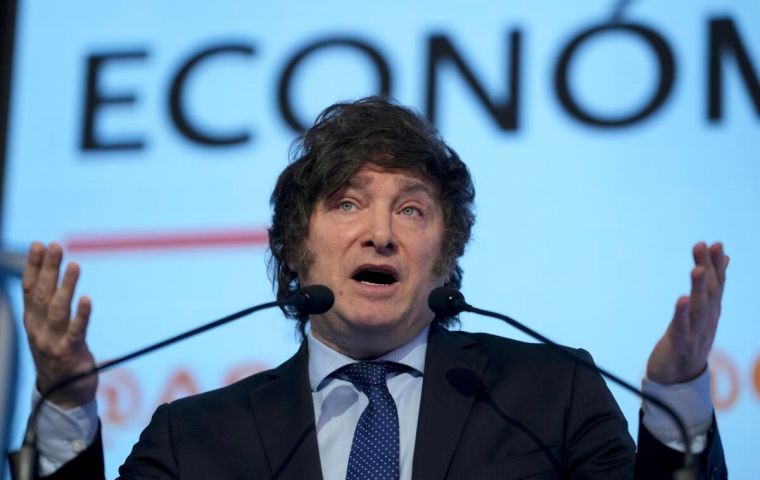MercoPress. South Atlantic News Agency
Main opposition candidates against Argentina joining BRICS
 Despite his stance regarding BRICS, Milei insisted that “we want the private sector to be able to trade with whomever it wants.”
Despite his stance regarding BRICS, Milei insisted that “we want the private sector to be able to trade with whomever it wants.” Libertarian Congressman and Presidential candidate Javier Milei Thursday rejected Argentina joining the BRICS on the ground that “I will not promote a deal with Communists.”
Milei also insisted that his geopolitical partners should he become president would be “the United States and Israel.” But “this does not mean the private sector cannot trade with whomever it wants,” he also warned.
South African President Cyril Ramaphosa announced earlier Thursday from Johannesburg that Argentina, Saudi Arabia, Egypt, Ethiopia, Iran, and the United Arab Emirates had been accepted as of Jan. 1 next into the group of emerging economies which includes Brazil, Russia, India, China and South Africa.
Milei's statements came after former Security Minister Patricia Bullrich, another leading contender for the Oct. 22 elections voiced her disapproval of something heralded by President Alberto Fernández as a diplomatic victory.
“[President Fernández] is in a situation of enormous weakness, unable to exercise his position as president and compromising Argentina. Under our government, the country will not be in the BRICS,” the Juntos por el Cambio (JxC) nominee said, leaving Economy Minister Sergio Massa of the ruling Unión por la Patria (UP) front as the only potential head of state who would keep Argentina within the global alliance. Bullrich still defended the country's inclusion in Mercosur and called for other free trade agreements to be implemented.
“Unlike the lies that Juntos por el Cambio and the related media that answer to their cashiers try to establish, we want the private sector to be able to trade with whomever it wants,” Milei stressed in a speech before the Council of the Americas during which he was once again verbatious against the “political caste” behind the “Argentine decadence.”
“We are the only serious project to make a 180º change to get Argentina back on its feet,” he added.
“The caste is not only the thieving politicians, but also the businessmen who like to do business with the State to have their cows tied up; the trade unionists who hand over their workers instead of representing them and the 'enveloped' microphones,” he went on.
“With this model of the caste of good or bad manners, we are going to be the biggest slum in the world,” he insisted.
Before businessmen in a Council of the Americas gathering together with the Argentine Chamber of Commerce, Bullrich pledged “to generate a structural order that will definitely change the Argentina of disorder, anomie, and chaos.” She also vowed to seek a zero deficit goal for the 2024 budget if elected in addition to moving forward with changes to the Central Bank's (BCRA) charter to guarantee its autonomy regarding monetary issuance and currency exchange restrictions.
At the same convention, Massa agreed that “we must simplify the exchange rate” but warned against dollarizing Argentina's economy.
“It is good to say nice phrases, but then you have to sit down and manage,” he said about his electoral opponents. “I don't ask you to take sides with a political force, take sides with your companies,” Massa told the attending businesspeople. “Where are the dollars from dollarization going to come from?” he wondered.
In Massa's view, Argentina “is not a developed country that can accept that all market rules develop freely” and favored choosing “an industrial development project” in October.
He also admitted that in his dealings with the International Monetary Fund (IMF), he was negotiating “from the point of view of a country with a structural crisis, such as Argentina's over-indebtedness crisis, aggravated by a serious economic crisis, such as the impact of the drought in terms of export volume and in Argentina's trade balance, which forces us to be very aware of the evolution of the reserves accumulation or loss regime” and pointed out that ”yesterday's Fund chapter was closed until November.




Top Comments
Disclaimer & comment rules-

-

-

Read all commentsI tend to agree with Javier Milei.
Aug 27th, 2023 - 12:31 am 0There are countries, like South African President Cyril Ramaphosa; who are seriously corrupt.
I have confidence in the Russian Ruble. China obviously has a specific agenda, whereas Brazil and India depend on free trade.
¡Saludos de Valle Nevado!
On a side note, current BRICS members include 4 of the world’s 5 biggest polluters, both in today and now historically as well.
Aug 27th, 2023 - 01:54 pm 0And their emissions are continuing to increase, significantly.
With the possible exception of Russia, they are also countries very exposed to the effects of climate change, imagine the failure of the rice crop in India or China, or severe drought in Brazil!
In the coming years, never mind decades, they are going to be very busy trying to adapt to the changes they are now driving.
Pugol
Aug 27th, 2023 - 06:34 pm 0Although I agree that the BRICS members are unethical, there are few options we can currently achieve without forcing trade sanctions.
Besides skiing, I'm enjoying one of Madame's books: Hugh Eakin's Picasso's War: How Modern Art Came to America.
I didn't think I'd like it, but it's very entertaining.
On another note, we're planning to depart the resort for Santiago tomorrow afternoon.
¡Saludos de Valle Nevado!
Commenting for this story is now closed.
If you have a Facebook account, become a fan and comment on our Facebook Page!